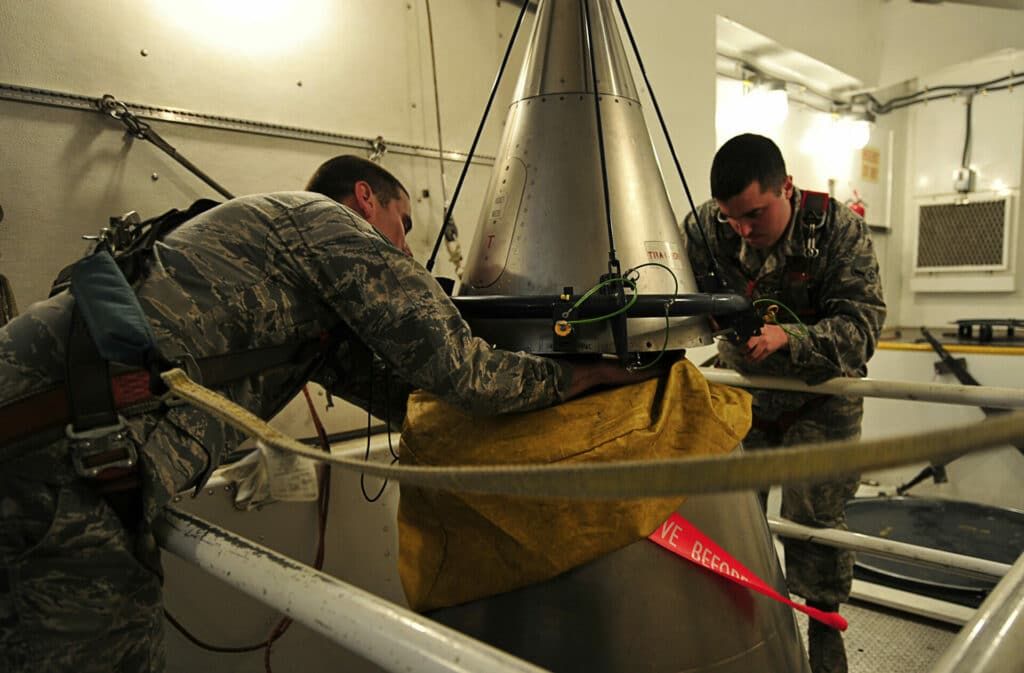Resuming New START inspections must be a critical goal of upcoming US-Russia talks
By Rose Gottemoeller | November 23, 2022
 US Air Force personnel perform a simulated missile reduction in accordance with the New Strategic Arms Reduction Treaty (New START) on Minot Air Force Base, N.D. in 2011.
On-site inspections under New START between the United States and the Russian Federation have been suspended since 2020. (Photo US Air Force / Airman 1st Class Desiree Esposito via Flickr)
US Air Force personnel perform a simulated missile reduction in accordance with the New Strategic Arms Reduction Treaty (New START) on Minot Air Force Base, N.D. in 2011.
On-site inspections under New START between the United States and the Russian Federation have been suspended since 2020. (Photo US Air Force / Airman 1st Class Desiree Esposito via Flickr)
Throughout the COVID-19 pandemic, the United States and Russian Federation have been working quietly to ensure that implementation of the New Strategic Arms Reduction Treaty (New START) remains on track. The verification regime of the treaty has worked remarkably well, with the parties exchanging data twice a year on their weapon holdings and regularly—sometimes multiple times a day—informing each other of the movement of their nuclear systems.
Through these measures—backed up by its own national technical means (satellites, reconnaissance aircraft, radars, etc.)—the United States has been able to keep a close eye on developments in the Russian strategic nuclear forces. This effort has proven highly important in recent months. It has been a significant source of predictability, offering 24/7 insights into Russian nuclear operations.
The effort has not been easy, however. The 18 on-site inspections that each party is allowed every year had to be suspended during the first wave of the COVID pandemic when mortality rates were high and no vaccines existed. The two sides mutually agreed to take this serious step, with full intent to return to on-site inspections as soon as the global health situation would allow it.
That was over two years ago. Since then, effective COVID vaccines and treatments have been developed and widely distributed. Neither the United States nor Russia maintains a policy similar to China’s “zero-COVID” approach, so the return of inspectors to each other’s territory has been foreseen for some time. Nevertheless, agreeing on COVID protocols has itself taken time, with the inspectors’ health and safety at the top of the agenda for both countries.
Then Russia invaded Ukraine in February 2022, which greatly complicated efforts to return to inspections after the pandemic. The political environment between Washington and Moscow rapidly deteriorated, hitting rock bottom (for good reason) and hampering communication on all topics of mutual concern—including, importantly, the control of strategic nuclear weapons. Russia’s war against Ukraine, punctuated by regular nuclear saber rattling, combined to raise concerns in Washington about whether Moscow would remain committed to bilateral nuclear arms control.
Fortunately, such signals out of the Kremlin did not become mainstream. Instead, Russian diplomats began to indicate that they would be ready to continue working on nuclear matters. These efforts have quietly born fruit.
For several months, the leaders of the implementing body of the New START Treaty—the Bilateral Consultative Commission (BCC)—have been in quiet contact. Issue by issue, they have been working to put in place the procedures and protocols that would allow New START inspections to resume. For example, since commercial flights between Russia and the United States were suspended after the Ukraine invasion, they have had to ensure that arrangements are in place for Russian inspectors to travel to the United States and vice versa.
This effort is culminating in November-December 2022 with a BCC meeting in Cairo. These are technical expert meetings including military personnel as well as diplomats. Those involved in BCC meetings know the treaty well and each side understands the capabilities of its own strategic nuclear forces. Meeting participants can ensure that on-site inspections under New START resume, but in a way that will not interrupt the operating tempo of the three legs of the strategic nuclear forces—intercontinental ballistic missiles, submarines, and bombers.
Although the resumption of on-site inspections will be high on the agenda, other issues will also be under discussion in Cairo. The Russians, for example, have long complained about the “conversion or elimination” procedures affecting US bombers and submarines. Despite having agreed to the procedures during the negotiation of the treaty, they say that they are unable to confirm that the conversions have taken place and the launchers in question are no longer nuclear. Resolving these issues should be straightforward once inspections resume.
The meeting will cap months of efforts to resume on-site inspections under New START. At almost two weeks, the length of the meeting gives many opportunities to make real progress on that matter. Of course, the work at hand will be all-important, but the two delegations will also have a chance to recollect the bigger picture. In conversations, both formal and informal, they may reflect on the fact that the United States and the Soviet Union, later Russia—as the two world’s largest nuclear powers—continued to work on controlling nuclear weapons even during the darkest days of the Cold War to avoid nuclear war.
If the upcoming US-Russian New START commission meeting goes well, its technical format might be valuable for other urgent discussions. Especially, since New START goes out of force in February 2026, the two parties might use the same technical experts to develop a framework for a follow-on treaty. The experts, both diplomats and members of the military, will have the knowledge base to get this process moving. Of course, they will need political guidance to do so, but both countries have declared their intention to pursue a new agreement. It is high time to get on with it.
Together, we make the world safer.
The Bulletin elevates expert voices above the noise. But as an independent nonprofit organization, our operations depend on the support of readers like you. Help us continue to deliver quality journalism that holds leaders accountable. Your support of our work at any level is important. In return, we promise our coverage will be understandable, influential, vigilant, solution-oriented, and fair-minded. Together we can make a difference.















